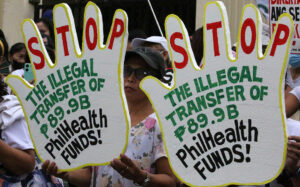By Beatriz Marie D. Cruz, Reporter
THE PHILIPPINE Health Insurance Corp. (PhilHealth) will proceed with the scheduled transfer of the remaining P29.9 billion in excess funds to the Treasury in November despite questions over its constitutionality, Finance Secretary Ralph G. Recto said.
“Yes, [the third tranche of] excess funds were remitted to the Treasury yesterday (Oct. 16). There is a scheduled remittance in November,” Mr. Recto told BusinessWorld in a Viber message.
He was referring to the P30 billion remitted by PhilHealth to the Bureau of the Treasury (BTr) on Wednesday.
The last tranche, amounting to P29.9 billion, will be transferred to the BTr in November. PhilHealth previously remitted P20 billion on May 10 and P10 billion on Aug. 21.
This comes despite a petition filed on Wednesday by 1SAMBAYAN Coalition and other groups seeking to halt the transfer of PhilHealth’s excess funds to the Treasury.
The petitioners said the fund transfers violated Article VI, Section 25 (5) of the Constitution. Under the Charter, “no law shall be passed authorizing any transfer of appropriations.”
“However, the President, the President of the Senate, the Speaker of the House of Representatives, the Chief Justice of the Supreme Court, and the heads of Constitutional Commissions may, by law, be authorized to augment any item in the general appropriations law for their respective offices from savings in other items of their respective appropriations.”
Separate petitions questioning the fund transfers were filed by Senate Minority Leader Aquilino Martin D. Pimentel III and former Finance Undersecretary Ma. Cielo D. Magno on Aug. 2 and Bayan Muna on Sept. 6.
The Supreme Court (SC) en banc will hold oral arguments on the fund transfers in January next year.
Sought for comment, Mr. Recto said: “We are only following Congress’ instructions in the budget. We will respect the decision of the Supreme Court.”
A provision included in the 2024 General Appropriations Act allowed the Department of Finance to issue Circular No. 003-2024, authorizing PhilHealth and the Philippine Deposit Insurance Corp. to transfer P89.9 billion and P110 billion, respectively.
These would help fund unprogrammed appropriations worth P203.1 billion, which would support government programs in health, infrastructure, and social services.
“Unlocking these excess fund balances is a more prudent fiscal option than borrowing more or imposing taxes,” the Department of Finance (DoF) said in July.
Mr. Recto earlier said that projects funded by unprogrammed appropriations will boost the real gross domestic product growth by 0.7%. It would also generate up to P24.4 billion in additional revenues and create more jobs.
The Finance chief also noted that the fund transfers would not impair the delivery of healthcare services, adding that PhilHealth would still have some P550 billion after the excess funds are remitted.
Meanwhile, medical groups are stepping up their efforts to stop PhilHealth’s fund transfers, said Anthony C. Leachon, former president of the Philippine College of Physicians.
“We will intensify our efforts to gather more supporters to stop the final transfer of P29.9 billion in November and hopefully influence the SC to expedite the issuance of TRO (temporary restraining order) or influence the decision in January in favor of the petitioners,” he said in a Viber message.
“The Executive branch should reflect on stopping the transfer since this unprecedented diversion of public funds has legal implications,” he added.
In August, healthcare representatives penned a letter to the DoF saying the excess funds of PhilHealth must be used to improve healthcare services.
